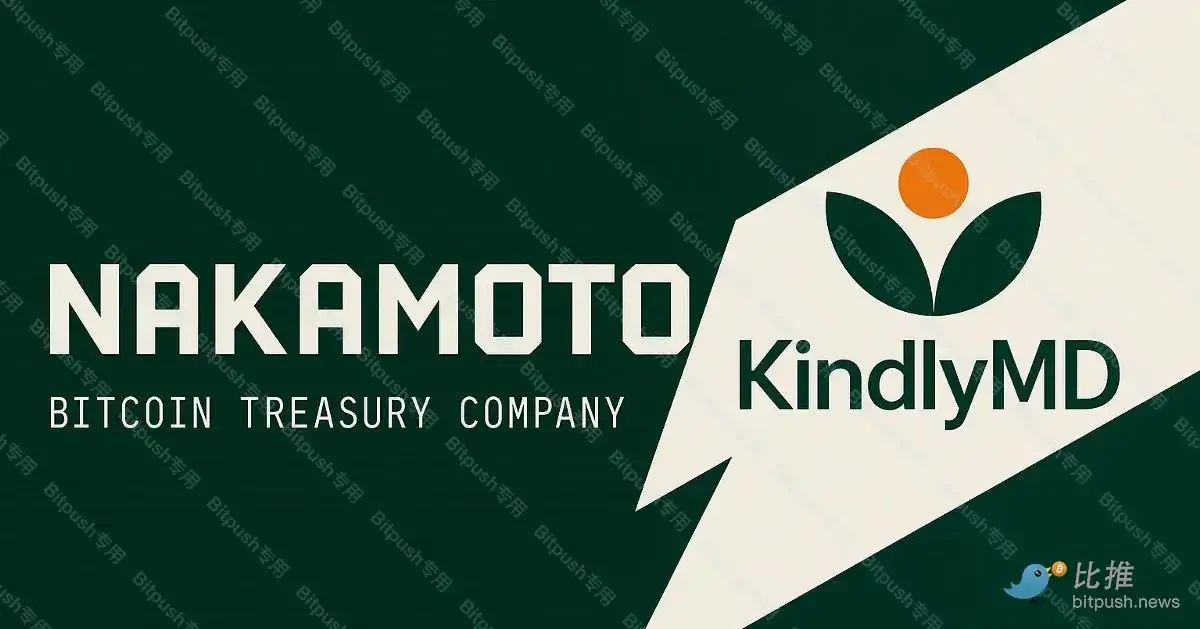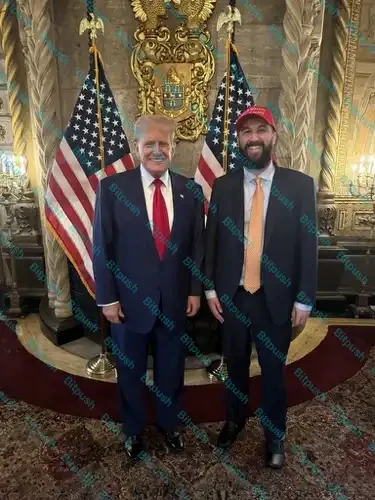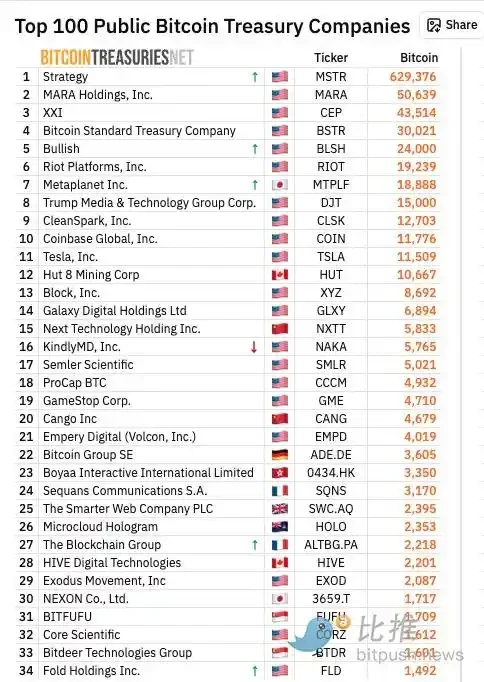Trump's Crypto Advisor's "Whale Debut": $680 Million "Bottom-Buying" BTC, Floating Losses of Tens of Millions
- 核心观点:医疗公司转型比特币国库,机构加速控盘。
- 关键要素:
- 斥资6.79亿美元购入5744枚比特币。
- 获知名机构及个人投资者7.1亿美元融资。
- 目标持有百万枚BTC,占总量近5%。
- 市场影响:机构主导比特币定价,散户影响力减弱。
- 时效性标注:长期影响。
Original Source: BitpushNews
In Salt Lake City, Utah, USA, KindlyMD was originally a network of clinics dedicated to treating opioid dependence. Founder and CEO Tim Pickett has repeatedly emphasized, "We don't just treat diseases; we help patients rebuild their lives." In the American healthcare system, KindlyMD has gained attention for its "holistic healthcare" model.

However, in August 2025, a piece of news thrust the company into the global crypto-finance spotlight: KindlyMD completed its merger with Nakamoto Holdings, officially transforming into a Bitcoin treasury company. Following the merger, the stock ticker was changed to NAKA, and the company immediately announced the purchase of 5,744 Bitcoins, spending approximately $679 million.
Overnight, this little-known medical company became a new whale in the Bitcoin capital market.
David Bailey: Bitcoin Evangelist and Trump "Advisor"
The person driving this transformation is David Bailey.

He is the CEO of Bitcoin Magazine and has long been active in Bitcoin industry conferences and industry promotion. He is regarded as one of the early evangelists of "Bitcoin treasuryization."
In 2023, he founded Nakamoto Holdings, a company with no complicated products or cumbersome operations, but only one goal: to buy Bitcoin with as much capital as possible.
Bailey calls it “the Bitcoin Treasury Project.”
During the 2024 U.S. presidential election, Bailey provided policy-level advice and exchanges to the Trump campaign team on issues related to digital assets and Bitcoin as an external advisor/opinion provider .
He is widely considered one of the key drivers of Trump's transformation from a crypto skeptic to a Bitcoin supporter. It was he who proposed to Trump the strategic idea of using crypto assets as policy chips and public asset reserves, thus influencing his stance and policy direction.

At last year's Bitcoin conference, Trump publicly said: "Dave, you did a wonderful job." ("So David, congratulations, whatever you do, you did a wonderful job.") to express his recognition of him.
According to CNBC, citing sources familiar with the matter, he visited the White House at least six times. Bailey himself publicly stated: "The president has fulfilled his promise to the Bitcoin industry, and I will always be grateful for that."
Notably, Bailey and Eric Trump (Trump's second son) are both members of the advisory board of Metaplanet, a Japanese microstrategy company. This creates a subtle resonant relationship between KindlyMD/NAKA's strategy and the Trump family's crypto-finance strategy.
PIPE + Convertible Bonds: Capital Magic
In the summer of 2025, Bailey found his own "listing vehicle" - KindlyMD.
KindlyMD's transformation wasn't simply a rebranding. Bailey, through a complex set of capital operations, prepared ammunition for NAKA:
- PIPE financing of US$540 million at an issue price of US$1.12 per share;
- The convertible bonds are worth US$200 million , with zero interest in the first two years and 6% interest from the third year onwards, and a conversion price of US$2.80.
Bailey told CNBC: "I was raising $100 million a day, sometimes $200 million a day."
The financing was backed by more than 200 investors, including Actai Ventures, Arrington Capital, BSQ Capital Partners, Kingsway, Van Eck, and Yorkville Advisors.
NAKA’s investor list is almost a Bitcoin Hall of Fame:
- Adam Back: Inventor of Hashcash, CEO of Blockstream.
- Balaji Srinivasan: Former Coinbase CTO, former partner at a 16z.
- Jihan Wu: Co-founder of Bitmain.
- Ricardo Salinas: Mexican billionaire and firm believer in BTC.
- Eric Semler: Wall Street veteran, Chairman of Semler Scientific.
- Simon Gerovich: CEO of Metaplanet, pushing the Japanese listed company to become the "MicroStrategy of Asia."
Type Description Institutional Investors Actai Ventures, Arrington Capital, BSQ Capital, Kingsway, Off The Chain, ParaFi, RK Capital, Van Eck, Yorkville Advisors (through YA II PN, Ltd.) Individual Investors Adam Back, Balaji Srinivasan, Danny Yang, Eric Semler, Jihan Wu, Ricardo Salinas, Simon Gerovich Financing Method PIPE (~$510 M), Convertible Notes ($200 M), concatenated for a total of approximately $710 M Fast Funding June PIPE $51.5 M, closed in just 72 hours
These names represent the capital power of the global Bitcoin industry. From Wall Street to Asia, from mining machines to exchanges, NAKA has assembled a global map of Bitcoin power.
With the support of capital, NAKA completed its "whale debut" right from the start: it bought 5,764.91 bitcoins at an average price of US$118,204 per bitcoin , directly ranking among the top 20 corporate bitcoin holders in the world.

Strategy²?
To understand NAKA's strategy, it must be placed in the context of Strategy (formerly MicroStrategy).
- Strategy: Since 2020, founder Michael Saylor has converted the company's cash into Bitcoin, and to date holds 629,376 BTC, valued at over $72 billion. It has become a "Bitcoin proxy stock," with its market capitalization deeply tied to BTC trends.
- NAKA: Currently holds only 5,765 BTC, equivalent to 0.9% of MicroStrategy.
But Bailey's goal is more radical: to establish a network of Bitcoin treasury companies in the global capital markets, ultimately holding 1 million BTC, accounting for nearly 5% of the total Bitcoin supply.
If MicroStrategy is a "pioneer," then NAKA is a "Strategy²."
But the market is always cruel.
NAKA bought the dip at an average price of $118,204. As of press time on August 19th, Bitcoin had fallen to a low of approximately $112,757, leaving NAKA with a floating loss of approximately $31.39 million. This loss is not significant, representing only 4% of the total investment. However, it reveals the inherent risk of the Bitcoin treasury model: stock prices and corporate value are almost completely tied to the Bitcoin price.
However, this is a long-term strategic game aimed at a million-level BTC reserve , and short-term fluctuations provide a better entry opportunity.
According to bitcointreasuries.net, there are currently 168 publicly listed companies holding Bitcoin, totaling more than 983,000 BTC, which is close to 5% of the total supply of Bitcoin.
In addition to MicroStrategy and NAKA, a new player is also attracting market attention: Twenty One. Co-founded by Tether, Bitfinex, Cantor Fitzgerald, and SoftBank, it initially held 43,500 BTC, valued at nearly $5 billion at current market prices. Although it has yet to officially trade, its consortium-based background suggests that the Bitcoin treasury model is evolving from a "single-company bet" to a phase of cross-industry consortium collaboration.
As capital giants begin to view Bitcoin as a core configuration of their balance sheets, the market's pricing power is quietly moving away from scattered retail investors and toward institutional alliances that control financing, investment banking tools and transnational resources.
Is this the beginning of a new chapter in financial history, or a replay of an old narrative?
Regardless of the answer, history will remember this moment: a medical company transformed into a Bitcoin whale. And behind the scenes, what truly influences Bitcoin's future price curve is no longer the sentiment of retail investors, but the patience and ambition of institutional capital.



